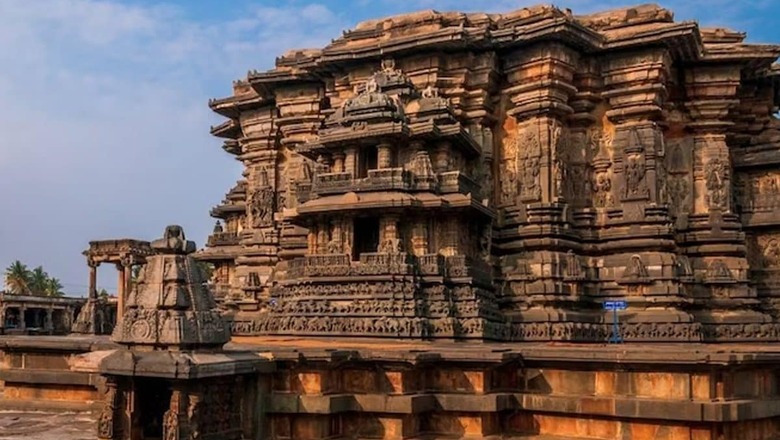
views
The Madras High Court this month directed the state government’s Tamil Nadu Hindu Religious and Charitable Endowments (HR&CE) department to install boards in Palani Dhandayuthapani Swamy Temple (and all other Hindu temples), stating that non-Hindus are not permitted beyond the Kodimaram (flagstaff). This created an impression that hordes of “non-Hindus” would be turned away from temples. But it appears to be much ado about nothing.
Because the “ban” is not a blanket one: the order also says if a non-Hindu wants to “visit a particular deity in a temple”, the person has to give an undertaking to the temple authorities that he/she has faith in the deity, and would “follow the practices of Hinduism, and of the temple”. He or she would then be allowed to have a darshan of the deity. This seems a valid caveat. Who would want to visit a functioning temple but refuse to abide by and respect its customs?
How many obstinate non-Hindus may potentially be refused entry by this verdict? Only 2.8 million Indians or 0.27% of the 1.2 billion counted in the 2011 census did not state a religion. Some 79.8% or 966 million were Hindus, which has surely crossed 1 billion in the 14 years since then. Of the remaining 19% non-Hindus, how many head to temples is moot. Also unclear is how many such atheists are hardcore enough to refuse to make even a token declaration of faith.
Before the Covid-19 pandemic skewed foreign tourist inflows, India got around 11 million annually, including desis holding other passports. But the number of Indians who visited pilgrimage places within the country in 2022 stood at a whopping 1.43 billion, which means they travelled to several such destinations in a year, accounting for the largest segment of domestic tourism. And according to Statista, this faith-based tourism in India generated US$902 million in 2022.
So, in addition to local Hindus frequenting nearby temples, the chances are that tourists visiting them from elsewhere in India are mostly of the same faith too. And though customs and practices do differ from place to place and even temple to temple, there are some universally followed principles. The High Court was right to point out that reasonable restrictions for conduct to ensure respect are more conducive to peaceful inter-community relations than a free-for-all.
As the case in question arose amid reports of “non-Hindus” using a certain Tamil Nadu temple’s premises as picnic spots—and eating non-vegetarian food there—rather than being mindful of the sanctity of the place, the court’s caution is timely. Other incidents of “non-Hindus” bringing their “holy book” to temples and attempting to conduct their religious practices within their precincts were also mentioned in the court’s judgement and probably prompted the final order.
In fact, the High Court aptly pointed out that if a non-Hindu who declines to follow customs is allowed inside the temple, it would affect the sentiments of the large number of Hindus there who practise the faith. And that in turn would affect the religious rights of those Hindus guaranteed under the Constitution. The “secular” Tamil Nadu government was also reminded that its HR & CE Department is mandated to protect the Hindu religion, its temples, customs, and practices.
The plea that “Non-Hindus not allowed” boards hurt the religious sentiments of those who would like to visit the temple did not stand to reason either. Given that exceptions will be made for those who sign an undertaking, the court rightly averred that if a non-Hindu is denied entry because he does not have faith and declines to follow customs, “there is no question of hurting his sentiment”. If there is no reverence for the deity, denial will hurt egos, not sentiments.
Non-Muslims are not allowed inside Mecca much less the Kaaba itself. There has been no protest about hurt sentiments on that count from visitors to Saudi Arabia who are not of the Islamic faith. Many Orthodox churches do not allow lay people, especially women, into the sanctum sanctorum, the equivalent of the garbha griha of temples. While many formerly prohibited places of Abrahamic faiths are now accessible, respect is a reasonable precondition for entry.
Ignorant Indians could, of course, presume important Hindu temples, especially in south India, are actually picnic spots as these are managed by respective state governments by virtue of controlling their endowments or funds through a series of legislation. Some state governments are deliberately lax about ensuring the decorum of the temples under their charge as the primary interest is controlling the use of the money collected in the hundis, so picnics are possible.
Curiously, government control of places of worship applies only to temples, not places of worship of any other religion, no matter how prominent and wealthy those may be. Corruption is also rife among government employees controlling the temples. How states and the Centre are involved in religious matters—financial administration of temples cannot be wholly secular—given the separation of powers principle is strange too. That, however, is a separate debate.
Why anyone would think that a functioning temple is an appropriate place for a picnic is hard to understand, although the Church of England has resorted to even parties inside some cathedrals in the hope that people drawn there by the food, alcohol, and pop music would be captivated enough to come back to the Church, literally and figuratively. Nothing of the sort happened, and those who attended such parties did not even end up thinking more positively about religion.
Tourists are not allowed to do whatever they please within functioning mosques. Managements of Sikh gurdwaras around the world insist and ensure that all those who enter the premises cover their heads, male or female, irrespective of faith—or even lack of it—and follow customs. No exceptions are allowed but nor has anyone protested against this “imposition”. No one is “caught” picnicking in gurdwaras and mosques with hampers of forbidden food items either.
That a High Court had to actually state that temples are not “picnic spots” speaks volumes about the attitude of the few who are unwilling to accept this simple fact without judicial muscle-flexing. Being mindful of devotees’ sentiments in any place of worship should be natural. The current issue is not about barring non-Hindus (as those of all faiths can still enter temples after giving an undertaking to follow customs) but the disrespect. No one should object to that.
The author is a freelance writer. Views expressed in the above piece are personal and solely those of the author. They do not necessarily reflect News18’s views.




















Comments
0 comment